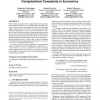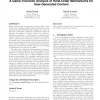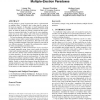SIGECOM
2011
ACM
12 years 7 months ago
2011
ACM
SIGECOM
2011
ACM
12 years 7 months ago
2011
ACM
ended abstract summarizes the research presented in Dr. Pardoe’s recently-completed Ph.D. thesis [Pardoe 2011]. The thesis considers how adaptive trading agents can take advantag...
SIGECOM
2011
ACM
12 years 7 months ago
2011
ACM
In this paper, we study the class of competitive equilibria in two sided matching markets with general (non-quasilinear) utility functions. Mechanism design in general non-quasili...
SIGECOM
2011
ACM
12 years 7 months ago
2011
ACM
: Many natural games can have a dramatic difference between the quality of their best and worst Nash equilibria, even in pure strategies. Yet, nearly all work to date on dynamics s...
SIGECOM
2011
ACM
12 years 7 months ago
2011
ACM
Market making refers broadly to trading strategies that seek to profit by providing liquidity to other traders, while avoiding accumulating a large net position in a stock. In th...
SIGECOM
2011
ACM
12 years 7 months ago
2011
ACM
Recent results in complexity theory suggest that various economic theories require agents to solve computationally intractable problems. However, such results assume the agents ar...
SIGECOM
2011
ACM
12 years 7 months ago
2011
ACM
SIGECOM
2011
ACM
12 years 7 months ago
2011
ACM
In many settings, a group of agents must come to a joint decision on multiple issues. In practice, this is often done by voting on the issues in sequence. In this paper, we model ...
SIGECOM
2011
ACM
12 years 7 months ago
2011
ACM
We introduce a matching model in which agents engage in joint ventures via multilateral contracts. This approach allows us to consider production complementarities previously outs...
SIGECOM
2011
ACM
12 years 7 months ago
2011
ACM
While social interactions are critical to understanding consumer behavior, the relationship between social and commerce networks has not been explored on a large scale. We analyze...



